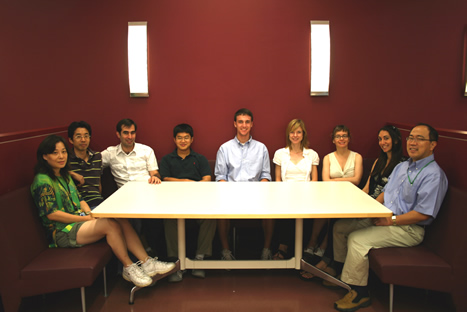| |
| |
| Kazu Nakazawa, M.D., Ph.D., Investigator |
 |
Dr. Kazu Nakazawa received his M.D. and Ph.D. degree in Department of Microbiology from Keio University School of Medicine in 1991, where he worked with Dr. Hisashi Narimatsu studying the elucidation of molecular diversity of mammalian glycosyltransferases. He began his post-doctoral training in the Laboratory for Neural Networks, Frontier Research Programs at the RIKEN Institute, Wako, Japan. There, he focused on the molecular and cellular mechanisms of cerebellar long-term depression under Dr. Masao Ito. In 1995, he moved to the Center for Learning and Memory at MIT as a research fellow and became a research associate in 2000. While working at MIT under Dr. Susumu Tonegawa and in collaboration with Dr. Matthew A. Wilson, Dr. Nakazawa discovered (1) CA3 NMDA receptors are crucial for memory acquisition of one-trial learning, (2) the same receptors are also required for associative memory recall (i.e., pattern completion) during recall. Dr. Nakazawa joined the NIMH in March, 2003. His laboratory is interested in clarifying the functional role of neuronal activity of rodent limbic cortex in mnemonic process implicated in declarative (explicit) memory.
|

|
Staff:

- Juan Belforte, Ph.D., Postdoctoral Fellow belfortej@mail.nih.gov
- Kimberly Christian, Ph.D., Postdoctoral Fellow christiank@mail.nih.gov
- Zhihong Jiang, Ph.D., Research Fellow zhihongjiang@mail.nih.gov
- Seiichiro Jinde, M.D., Ph.D., Postdoctoral Fellow jindes@mail.nih.gov
- Elyse Sklar, B.S., Laboratory Technician sklare@mail.nih.gov
- Veronika Zsiros, Ph.D., Research Fellow zsirosv@mail.nih.gov
Research Interests:
The major thrust of our research is to understand the molecular and cellular mechanisms underlying cognitive function. In particular, we focus on two fundamental questions of modern neuroscience. The first question is to clarify the functional roles of particular brain regions, including area CA3, in learning and memory, and to identify neural substrates underlying these functions. We believe that the combination of in vivo monitoring of neural activity with behavioral manipulation on learning and memory paradigms is a powerful approach for identifying neural mechanisms that underlie behavioral phenotypes following gene manipulation. Our second research focus is to develop new conditional mutant mice in which conscious state is modified. It is generally accepted that the hippocampus is a site of awareness or conscious recollection. Damage to the hippocampus formation in humans produced an intergraded amnesia, which strongly impairs the acquisition of new episodic information about individual events and experiences accessible to conscious control. The hippocampus, as well as the nucleus accumbens, is also thought to be involved in attention mechanism. The ultimate goal of this project is to understand the neural basis of mental states of animals during behavior, such as consciousness, awareness or attention.
|
Selected Recent Publications:
Cravens CJ, Vargas-Pinto N, Christian KM, Nakazawa K (2006) CA3 NMDA Receptors are Crucial for Rapid and Automatic Representation of Context Memory, Eur. J. Neurosci. 24, 1771-1780.
Kishimoto Y, Nakazawa K, Tonegawa S, Kirino Y, Kano M (2006) Hippocampal CA3 NMDA Receptors Are Crucial for Adaptive Timing of Trace Eyeblink Conditioned Response, J. Neurosci, 26, 1562-1570.
Nakazawa K, McHugh TJ, Wilson MA, Tonegawa S. (2004) NMDA receptors, place cells and hippocampal spatial memory. , Nature Rev Neurosci 5, 361-372.
Full Text/Abstract
Nakazawa K Sun LD Quirk MC Rondi-Reig L Wilson MA Tonegawa S (2003) Hippocampal CA3 NMDA Receptors Are Crucial for Memory Acquisition of One-Time Experience., Neuron 38, 305-15.
Full Text/Abstract
Nakazawa K Quirk MC Chitwood RA Watanabe M Yeckel MF Sun LD Kato A Carr CA Johnston D Wilson MA Tonegawa S (2002) Requirement for hippocampal CA3 NMDA receptors in associative memory recall., Science 297, 211-8.
Full Text/Abstract
Contact Information:
Dr. Kazu Nakazawa
Genetics of Cognition and Behavior Unit, NIMH
Porter Neuroscience Research Center
Building 35, Room 1C-915
35 Convent Drive, MSC 3710
Bethesda, MD 20892-3710
Telephone: (301) 451-3499 (office),
(301) 451-3499 (laboratory),
(301) 480-0123 (fax)
Email: nakazawk@intra.nimh.nih.gov
|
|















